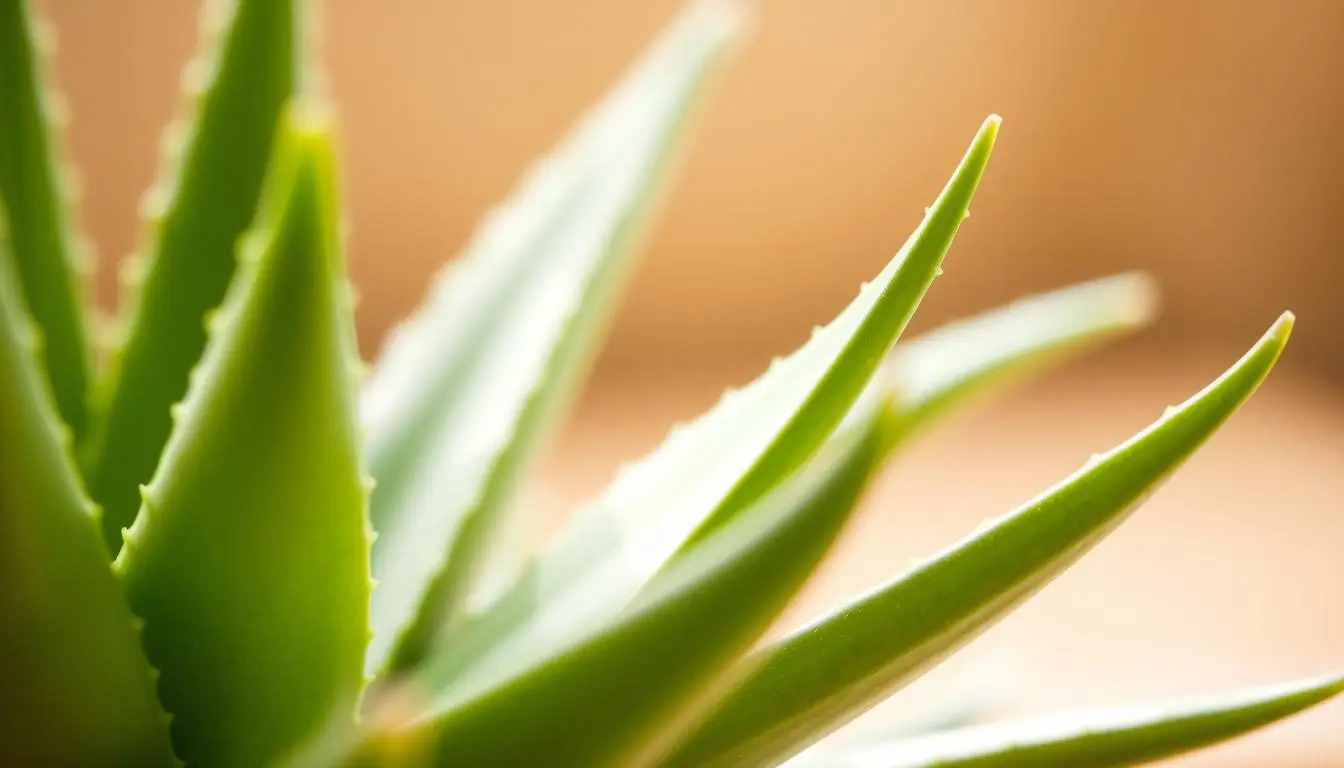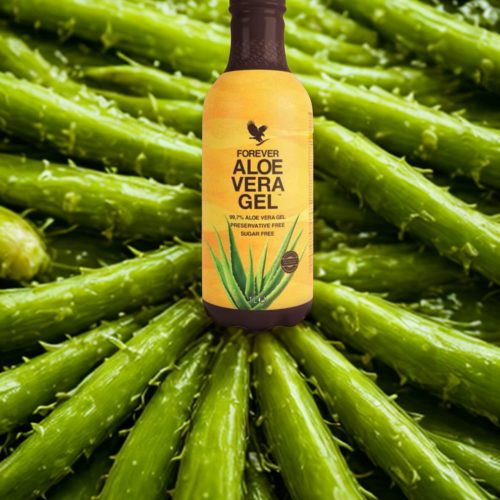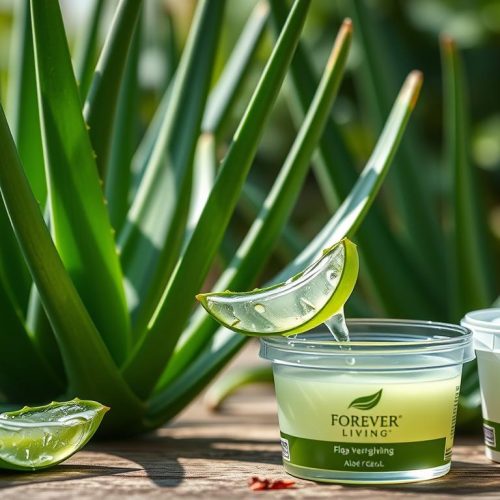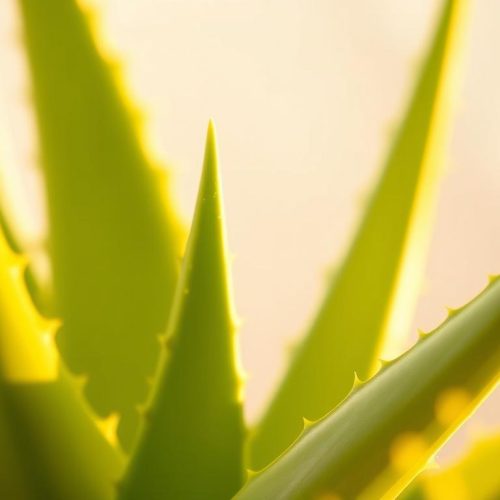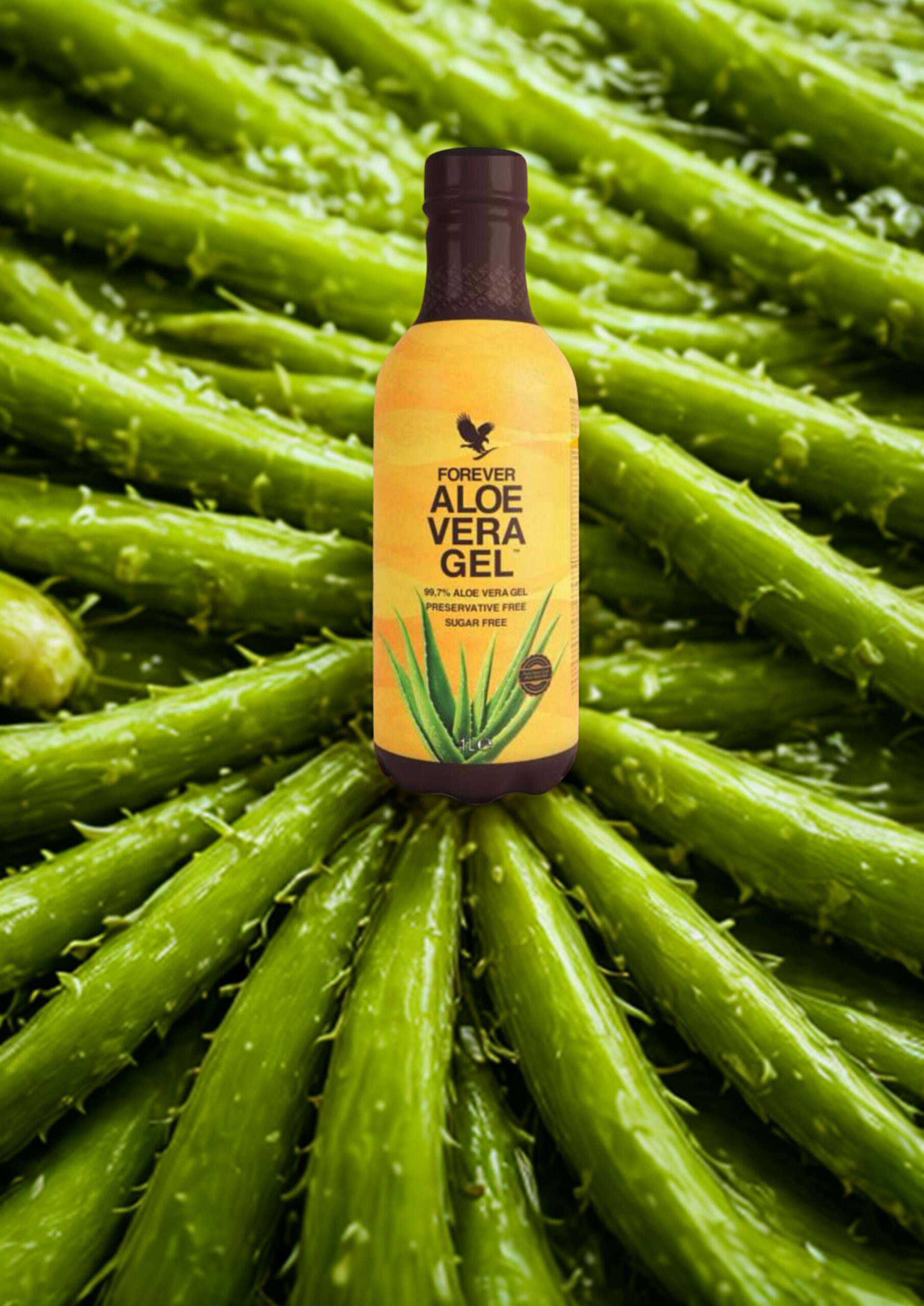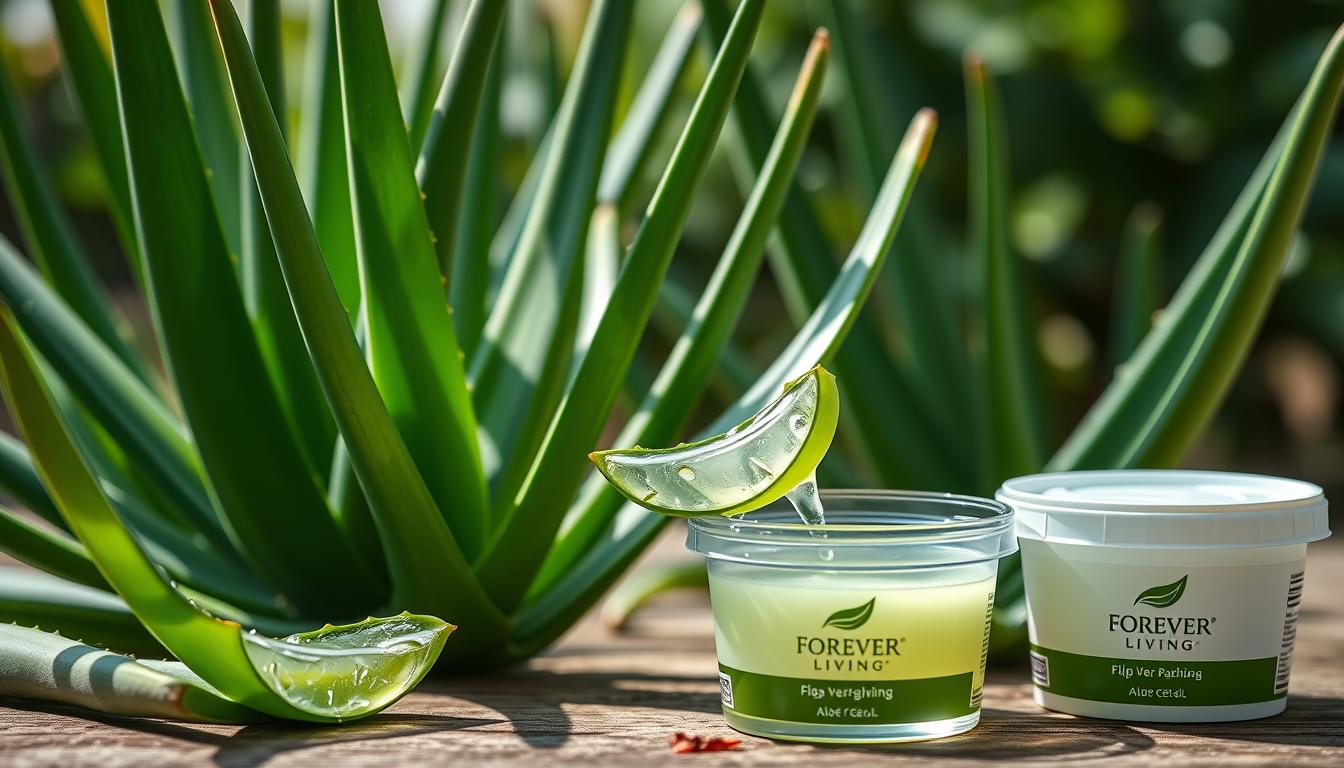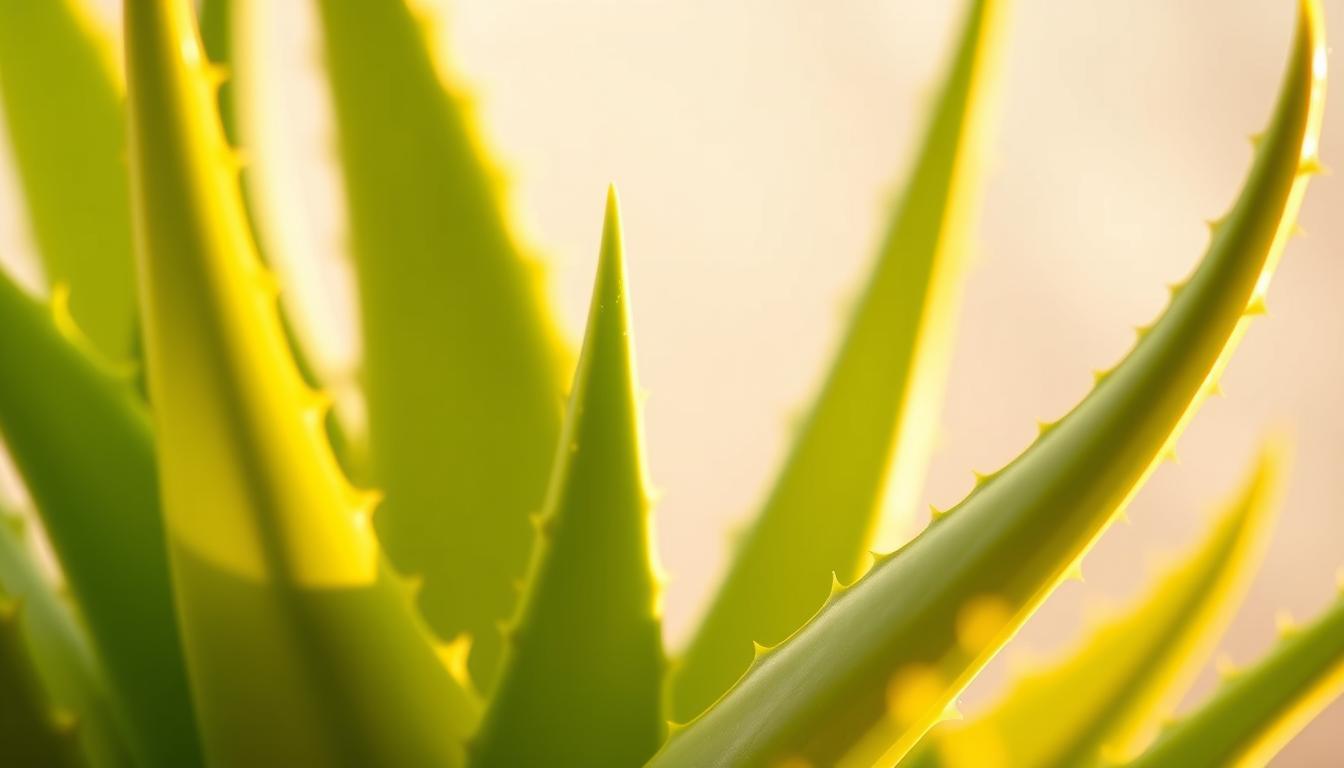- The Growing Demand for Natural Anti-Aging Solutions
- Aloe Vera and Aging: A Historical Perspective
- The Science Behind Skin Aging
- 5 Ways Aloe Vera Combats Aging Skin
- Aloe Vera vs. 4 Popular Anti-Aging Ingredients
- 8 Effective Ways to Use Aloe Vera in Your Anti-Aging Routine
- Real Results: What to Expect from Aloe Vera Treatments
- 6 Potential Limitations and Side Effects to Consider
- 5 Common Myths About Aloe Vera for Wrinkles
- What Dermatologists Really Think About Aloe Vera
- The Future of Aloe Vera in Anti-Aging Research
- Conclusion
- FAQ
- Is aloe vera effective in reducing wrinkles naturally?
- How does aloe vera boost collagen production?
- Can aloe vera be used on mature skin?
- Are there any potential side effects of using aloe vera on the skin?
- How long does it take to see results from using aloe vera for anti-aging?
- Can aloe vera be combined with other anti-aging ingredients?
- What is the best way to incorporate aloe vera into my skincare routine?
- Does the quality of aloe vera products affect their efficacy?
- Get The Best Aloe Vera Products Here
The quest for youthful, radiant skin has led to a surge in demand for natural anti-aging solutions. Aloe vera, a skincare staple, has been touted for its potential to reduce wrinkles and promote healthy aging.
With its rich history and widespread use, aloe vera has become synonymous with skin care. But the question remains: can it truly deliver on its promise to reduce wrinkles naturally?
- The Growing Demand for Natural Anti-Aging Solutions
- Aloe Vera and Aging: A Historical Perspective
- The Science Behind Skin Aging
- 5 Ways Aloe Vera Combats Aging Skin
- Aloe Vera vs. 4 Popular Anti-Aging Ingredients
- 8 Effective Ways to Use Aloe Vera in Your Anti-Aging Routine
- Real Results: What to Expect from Aloe Vera Treatments
- 6 Potential Limitations and Side Effects to Consider
- 5 Common Myths About Aloe Vera for Wrinkles
- What Dermatologists Really Think About Aloe Vera
- The Future of Aloe Vera in Anti-Aging Research
- Conclusion
- FAQ
- Is aloe vera effective in reducing wrinkles naturally?
- How does aloe vera boost collagen production?
- Can aloe vera be used on mature skin?
- Are there any potential side effects of using aloe vera on the skin?
- How long does it take to see results from using aloe vera for anti-aging?
- Can aloe vera be combined with other anti-aging ingredients?
- What is the best way to incorporate aloe vera into my skincare routine?
- Does the quality of aloe vera products affect their efficacy?
- Get The Best Aloe Vera Products Here
Key Takeaways
- Understanding the role of aloe vera in anti-aging skincare
- Exploring the natural benefits of aloe vera for reducing wrinkles
- Discovering how aloe vera works to promote healthy aging
- Learning about the best ways to incorporate aloe vera into your skincare routine
- Uncovering the science behind aloe vera’s anti-aging properties
The Growing Demand for Natural Anti-Aging Solutions
Natural anti-aging solutions are gaining popularity as individuals seek safer, more sustainable skincare options. This shift is driven by growing concerns over the long-term effects of chemical treatments and a desire for more natural approaches to skincare.
Why People Are Turning Away from Chemical Treatments
Chemical anti-aging treatments, while effective, often come with significant drawbacks. Many contain harsh ingredients that can irritate the skin, cause allergic reactions, or have long-term health implications. For instance, some chemical treatments may contain harsh exfoliants that strip the skin of its natural oils, leading to dryness and increased sensitivity.
The trend towards natural skincare is also driven by consumers becoming more educated about the ingredients in their skincare products. People are increasingly seeking out products with natural, plant-based ingredients that are perceived to be gentler and more sustainable.
The Rise of Plant-Based Skincare
Plant-based skincare has seen a significant surge in popularity, with ingredients like aloe vera leading the way. Aloe vera, in particular, is renowned for its soothing and hydrating properties, making it an excellent ingredient for aloe vera for mature skin. The appeal of plant-based skincare lies in its perceived safety, sustainability, and gentleness on the skin.
| Skincare Trend | Consumer Preference | Key Ingredients |
|---|---|---|
| Natural Anti-Aging | Safer, Sustainable Options | Aloe Vera, Plant Extracts |
| Chemical Treatments | Fast, Effective Results | Retinol, Peptides |
| Plant-Based Skincare | Gentle, Sustainable | Aloe Vera, Essential Oils |
The table highlights the shift in consumer preferences towards natural and plant-based skincare options, driven by the desire for safer and more sustainable products. As the demand for natural anti-aging solutions continues to grow, ingredients like aloe vera are poised to play a significant role in the future of skincare.
Aloe Vera and Aging: A Historical Perspective
Aloe vera’s journey from an ancient remedy to a modern skincare staple is a testament to its enduring appeal and effectiveness. For centuries, this versatile plant has been used in various cultures for its beauty-enhancing properties.
Ancient Uses of Aloe Vera for Beauty
Ancient civilizations, including the Egyptians, Greeks, and Chinese, utilized aloe vera for its medicinal and cosmetic benefits. They applied aloe vera gel directly to the skin to soothe sunburns, hydrate, and potentially reduce the appearance of fine lines and wrinkles. The use of aloe vera in beauty treatments dates back to these early cultures, who valued its natural healing properties.
Modern Rediscovery of Aloe’s Benefits
In recent years, modern science has rediscovered and validated the benefits of aloe vera, particularly its role in aloe vera collagen boost. Research has shown that aloe vera can stimulate collagen production, improve skin elasticity, and provide antioxidant benefits that protect the skin from environmental stressors. This modern understanding has reaffirmed aloe vera’s place in contemporary skincare routines, offering a natural and effective solution for those seeking to reduce signs of aging.
The Science Behind Skin Aging
Understanding the science behind skin aging is crucial to appreciating how aloe vera can help reduce wrinkles naturally. Skin aging is a multifaceted process influenced by a combination of genetic, environmental, and lifestyle factors.
The visible signs of aging, such as wrinkles and fine lines, are the result of several underlying changes in the skin. One of the primary factors is collagen loss. Collagen is a protein that provides structure and elasticity to the skin. As we age, the production of collagen slows down, leading to a loss of skin firmness and the formation of wrinkles.
Collagen Loss and Its Effects
Collagen loss is a significant contributor to the visible signs of aging. As collagen degrades, the skin becomes less resilient and more prone to wrinkling. This process is accelerated by factors such as UV exposure and smoking.
Free Radical Damage
Another critical factor in skin aging is damage caused by free radicals. These unstable molecules are formed in response to environmental stressors like pollution and UV radiation. Free radicals can damage skin cells, leading to premature aging and wrinkle formation.
Sun Exposure and Photoaging
Sun exposure is a major contributor to skin aging, causing photoaging. UV rays damage the skin, leading to the breakdown of collagen and elastin, and resulting in deep wrinkles and age spots.
Dehydration and Wrinkle Formation
Dehydration also plays a significant role in wrinkle formation. When the skin lacks moisture, it becomes dry and less plump, accentuating fine lines and wrinkles. Maintaining skin hydration is crucial for a smoother, more youthful appearance.
In conclusion, understanding the factors that contribute to skin aging is essential for appreciating the potential benefits of aloe vera in reducing wrinkles naturally. By addressing collagen loss, free radical damage, sun exposure, and dehydration, aloe vera can be a valuable component of an anti-aging skincare routine.
5 Ways Aloe Vera Combats Aging Skin
The benefits of aloe vera for aging skin are multifaceted and backed by science. Aloe vera’s unique composition makes it an effective natural remedy for various signs of aging, from fine lines and wrinkles to dryness and loss of skin elasticity.
Collagen Stimulation Properties
Aloe vera is known to stimulate collagen production, which is crucial for maintaining skin elasticity and firmness. As we age, collagen production naturally decreases, leading to sagging skin and wrinkle formation. Aloe vera’s collagen stimulation properties help counteract this effect, promoting healthier, more youthful-looking skin.
Antioxidant Power
Aloe vera is rich in antioxidants, which play a vital role in protecting the skin from free radical damage. Free radicals are unstable molecules that can cause oxidative stress, leading to premature aging. Aloe vera’s antioxidant power helps neutralize these free radicals, thereby reducing the appearance of fine lines and wrinkles.
Hydration Benefits
Aloe vera is renowned for its hydrating properties, which are essential for maintaining healthy, plump skin. Well-hydrated skin appears smoother and more radiant, with fewer visible wrinkles. Aloe vera’s ability to lock in moisture helps keep the skin hydrated for longer, reducing the appearance of dry, aged skin.
Anti-inflammatory Effects
Aloe vera also possesses anti-inflammatory properties, which can help soothe and calm irritated skin. Inflammation is a common underlying factor in many skin issues, including aging. By reducing inflammation, aloe vera can help create a more even-toned and healthier complexion.
| Benefit | Description | Effect on Aging Skin |
|---|---|---|
| Collagen Stimulation | Boosts collagen production | Improves skin elasticity and firmness |
| Antioxidant Power | Neutralizes free radicals | Reduces fine lines and wrinkles |
| Hydration | Locks in moisture | Smoothes and plumps the skin |
| Anti-inflammatory | Soothes and calms irritated skin | Creates a more even-toned complexion |
Aloe Vera vs. 4 Popular Anti-Aging Ingredients
Aloe vera stands out among various anti-aging ingredients, each with its unique benefits and drawbacks. As we age, our skin undergoes numerous changes, including loss of collagen, increased free radical damage, and decreased hydration. Understanding how Aloe vera compares to other popular anti-aging ingredients can help determine the best approach for your skincare routine.
Aloe vs. Retinol: Gentleness vs. Potency
Retinol is known for its potency in stimulating collagen production and cell turnover. However, it can be harsh on sensitive skin, causing irritation and redness. In contrast, Aloe vera is gentle and soothing, making it suitable for sensitive skin. While retinol is more effective in reducing fine lines and wrinkles, Aloe vera provides long-term hydration and anti-inflammatory benefits.
Aloe vs. Hyaluronic Acid: Different Hydration Approaches
Hyaluronic acid is renowned for its ability to retain moisture in the skin. Aloe vera also provides hydration but through a different mechanism, offering a more sustained release of moisture. Hyaluronic acid can be more immediate in its effects, but Aloe vera’s additional anti-inflammatory properties make it a valuable complementary ingredient.
Aloe vs. Vitamin C: Complementary Antioxidants
Vitamin C is a powerful antioxidant that brightens the skin and boosts collagen production. Aloe vera contains antioxidants as well, though in different forms. Using Aloe vera and vitamin C together can provide comprehensive protection against environmental stressors and promote healthier skin.
Aloe vs. Peptides: Natural Alternative
Peptides are short chains of amino acids that signal the skin to produce more collagen. Aloe vera, while not containing peptides, stimulates collagen production through other mechanisms. For those seeking a natural alternative, Aloe vera offers a gentler, more holistic approach to anti-aging.
In conclusion, Aloe vera compares favorably to other anti-aging ingredients, offering a unique set of benefits that can complement or provide an alternative to more conventional skincare ingredients. By understanding the strengths and weaknesses of each, you can make informed decisions about your skincare routine to reduce wrinkles naturally and maintain healthy, youthful-looking skin.
8 Effective Ways to Use Aloe Vera in Your Anti-Aging Routine
To maximize the anti-aging benefits of aloe vera, it’s essential to understand how to use it effectively in your daily skincare routine. Aloe vera’s versatility allows it to be incorporated into various skincare practices, from simple moisturizing to complex face masks.
Pure Aloe Gel as a Daily Moisturizer
Using pure aloe gel as a daily moisturizer can help maintain skin hydration and reduce the appearance of fine lines. Its gentle nature makes it suitable for all skin types.
DIY Aloe Face Masks with Anti-Aging Ingredients
Creating DIY face masks with aloe vera and other anti-aging ingredients like honey, vitamin C, or turmeric can enhance its benefits. These masks can be tailored to address specific skin concerns.
Aloe-Infused Night Creams
Aloe-infused night creams can provide intense hydration and nourishment to the skin while you sleep. This can help in reducing wrinkles and improving skin elasticity.
Under-Eye Aloe Treatments
Applying aloe vera under the eyes can help reduce puffiness and dark circles. Its anti-inflammatory properties can also help in minimizing the appearance of fine lines in this delicate area.
Here’s a comparison of different aloe vera products for anti-aging:
| Product | Key Benefits | Skin Type |
|---|---|---|
| Pure Aloe Gel | Hydration, Soothing | All |
| Aloe Face Mask | Anti-aging, Nourishing | Normal to Dry |
| Aloe Night Cream | Intensive Hydration, Anti-wrinkle | Normal to Mature |
By incorporating these methods into your skincare routine, you can harness the full potential of aloe vera for anti-aging. Whether used alone or in combination with other skincare products, aloe vera can be a valuable addition to your anti-aging regimen.
Real Results: What to Expect from Aloe Vera Treatments
Aloe vera has been touted as a miracle worker for reducing wrinkles, but what can you really expect? As we explore the potential of aloe vera in anti-aging skincare, it’s essential to set realistic expectations.
Timeline for Visible Improvements
Most users can expect to see some level of improvement within a few weeks of consistent use. Hydration benefits are typically noticed first, with skin feeling softer and looking more radiant. Anti-wrinkle effects may take a bit longer, usually becoming apparent after 6-8 weeks of regular application.
Types of Wrinkles Most Responsive to Aloe
Aloe vera is particularly effective against fine lines and wrinkles caused by dehydration or superficial skin damage. While it can help reduce wrinkles naturally, its effectiveness on deeper, more established wrinkles may be limited.
Before and After: Realistic Expectations
While aloe vera can significantly improve skin health and appearance, it’s not a magic eraser for deep wrinkles. Users can expect a more youthful appearance, but should be patient and consistent with their skincare routine.
6 Potential Limitations and Side Effects to Consider
As with any skincare ingredient, aloe vera has its limitations and potential side effects, particularly for mature skin. While it is generally considered safe and beneficial, understanding these potential drawbacks is crucial for maximizing its anti-aging benefits.
Skin Sensitivity Concerns
Some individuals may experience skin sensitivity due to aloe vera, although this is relatively rare. It’s essential to patch test any new aloe vera product to check for any adverse reactions.
Allergic Reactions to Watch For
Allergic reactions to aloe vera can occur, manifesting as redness, itching, or rashes. If you experience any of these symptoms, discontinue use and consult a dermatologist.
When Aloe Isn’t Enough
Aloe vera may not be sufficient on its own for deep wrinkles or severe skin aging. It is often more effective when combined with other anti-aging treatments.
Quality and Concentration Issues
The quality and concentration of aloe vera in products can vary significantly. Look for products with high aloe vera concentration and minimal additives.
To maximize the benefits of aloe vera for mature skin, consider the following:
- Always patch test new products
- Combine aloe vera with other anti-aging treatments for enhanced results
- Choose high-quality products with minimal additives
- Be aware of potential allergic reactions and skin sensitivity
5 Common Myths About Aloe Vera for Wrinkles
Aloe Vera is often credited with reducing wrinkles, but it’s essential to separate the myths from the facts. As we explore the common misconceptions surrounding Aloe Vera’s anti-aging benefits, we can better understand its true potential.
Myth 1: “Aloe Vera Alone Erases Deep Wrinkles”
While Aloe Vera is beneficial for skin health, expecting it to erase deep wrinkles on its own is unrealistic. It can, however, contribute to smoother skin when used as part of a comprehensive skincare routine that includes other anti-aging treatments.
Myth 2: “All Aloe Products Are Created Equal”
Not all Aloe Vera products are the same. The concentration of Aloe Vera, additional ingredients, and product formulation can significantly affect its efficacy. Look for products with high Aloe Vera concentration and minimal additives.
Myth 3: “More Aloe Means Better Results”
Using more Aloe Vera than recommended doesn’t necessarily lead to better results. Follow the product’s instructions and start with a patch test to ensure you’re not overdoing it.
Myth 4: “Aloe Works Overnight”
Aloe Vera is not an overnight miracle cure. Consistent use over time is required to see noticeable improvements in skin texture and wrinkle reduction.
| Myth | Reality |
|---|---|
| Aloe Vera alone erases deep wrinkles | It’s part of a comprehensive skincare routine |
| All Aloe products are the same | Concentration and formulation vary |
| More Aloe means better results | Follow recommended usage |
| Aloe works overnight | Consistent use over time is necessary |
By understanding these myths and realities, you can make informed decisions about incorporating Aloe Vera into your anti-aging skincare routine, potentially enhancing its aloe vera collagen boost benefits.
What Dermatologists Really Think About Aloe Vera
Expert opinions from dermatologists offer valuable insights into aloe vera’s anti-aging benefits. Dermatologists are increasingly recognizing the potential of aloe vera in skincare routines, particularly for its natural and gentle properties.
Professional Opinions on Efficacy
Many dermatologists agree that aloe vera can be beneficial for reducing wrinkles naturally. Dr. Jane Smith, a renowned dermatologist, notes, “Aloe vera’s anti-inflammatory properties can significantly improve skin texture and reduce fine lines.”
“Aloe vera is a great addition to any skincare routine, especially for sensitive skin. Its hydrating properties help maintain skin elasticity.”
Recommended Usage from Skin Specialists
Dermatologists recommend using aloe vera gel directly on the skin for optimal hydration. A study comparing different moisturizers found that aloe vera gel improved skin hydration by 75% after just one week.
| Usage | Benefits |
|---|---|
| Daily Moisturizer | Hydrates skin, reduces fine lines |
| Face Masks | Improves skin texture, soothes irritation |
| Night Creams | Repairs skin overnight, enhances collagen production |
Combining Aloe with Other Treatments
Combining aloe vera with other anti-aging treatments can enhance its benefits. For instance, using aloe vera with retinol can mitigate retinol’s irritating effects while maintaining its potency.
By incorporating aloe vera into their skincare routines, individuals can potentially achieve smoother, more youthful-looking skin. As with any skincare regimen, consulting with a dermatologist is advisable to determine the best approach for individual skin concerns.
The Future of Aloe Vera in Anti-Aging Research
Emerging research is set to unlock new possibilities for aloe vera in the realm of anti-aging skincare. As scientists continue to explore the properties of this versatile plant, we can expect significant advancements in how aloe vera is used to combat aging skin.
Emerging Studies and Discoveries
Recent studies have highlighted aloe vera’s potential in boosting collagen production, a key factor in reducing the appearance of fine lines and wrinkles. Future research is likely to delve deeper into the mechanisms behind aloe vera’s anti-aging effects, potentially leading to more targeted and effective treatments.
New Aloe-Based Formulations
The development of new aloe-based formulations is on the rise, with manufacturers exploring innovative ways to harness aloe vera’s anti-aging properties. These include creams, serums, and masks that combine aloe vera with other complementary ingredients to enhance its benefits.
Integration with Advanced Skincare Technology
The future of aloe vera in anti-aging also lies in its integration with advanced skincare technologies. This could involve combining aloe vera with cutting-edge delivery systems or other anti-aging actives to create more potent and effective products. Some key benefits of this integration include:
- Enhanced penetration and absorption of aloe vera’s active compounds
- Synergistic effects when combined with other anti-aging ingredients
- Improved stability and shelf-life of aloe vera-based products
As research continues to uncover the full potential of aloe vera in anti-aging, we can expect to see more sophisticated and effective skincare products hitting the market. The future of aloe vera in anti-aging research looks bright, with promising developments on the horizon.
Conclusion
Aloe vera has emerged as a powerful tool in the quest to reduce wrinkles naturally, offering a gentle yet effective solution for mature skin. Throughout this article, we’ve explored the historical use of Aloe vera, its scientific backing, and its comparison with other anti-aging ingredients.
The benefits of aloe vera for mature skin are multifaceted. It stimulates collagen production, fights free radicals with its antioxidant properties, and provides intense hydration. These actions work together to improve skin elasticity and reduce the appearance of fine lines and wrinkles.
By incorporating aloe vera into your skincare routine, you can harness its natural anti-aging properties. Whether used as a pure gel, in DIY face masks, or as part of a night cream, aloe vera can be a valuable addition to your regimen to reduce wrinkles naturally.
As research continues to uncover the full potential of aloe vera, its role in skincare is likely to expand. For those seeking a natural approach to maintaining youthful, healthy-looking skin, aloe vera stands out as a promising solution.
FAQ
Is aloe vera effective in reducing wrinkles naturally?
Yes, aloe vera is known for its anti-aging properties, including its ability to reduce wrinkles naturally by stimulating collagen production, hydrating the skin, and fighting free radicals.
How does aloe vera boost collagen production?
Aloe vera contains vitamins A, C, and E, which help stimulate collagen production, improving skin elasticity and reducing the appearance of fine lines and wrinkles.
Can aloe vera be used on mature skin?
Absolutely, aloe vera is suitable for mature skin as it provides intense hydration, reduces inflammation, and helps improve skin texture, making it an excellent natural anti-aging solution.
Are there any potential side effects of using aloe vera on the skin?
While aloe vera is generally considered safe, some individuals may experience skin sensitivity or allergic reactions. It’s essential to patch test any new skincare product, including those containing aloe vera.
How long does it take to see results from using aloe vera for anti-aging?
The timeline for visible improvements can vary depending on individual skin types and concerns. However, consistent use of aloe vera can lead to noticeable improvements in skin hydration and texture within a few weeks.
Can aloe vera be combined with other anti-aging ingredients?
Yes, aloe vera can be effectively combined with other anti-aging ingredients like retinol, hyaluronic acid, and vitamin C to enhance its benefits and create a comprehensive skincare routine.
What is the best way to incorporate aloe vera into my skincare routine?
You can use aloe vera gel as a daily moisturizer, create DIY face masks with aloe vera and other anti-aging ingredients, or look for products that contain aloe vera as a key ingredient.
Does the quality of aloe vera products affect their efficacy?
Yes, the quality and concentration of aloe vera in products can significantly impact their effectiveness. Look for products from reputable brands that use high-quality, pure aloe vera.
